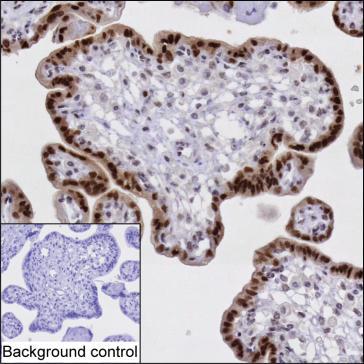
| WB | 咨询技术 | Human,Mouse,Rat |
| IF | 咨询技术 | Human,Mouse,Rat |
| IHC | 1/20-1/100 | Human,Mouse,Rat |
| ICC | 技术咨询 | Human,Mouse,Rat |
| FCM | 咨询技术 | Human,Mouse,Rat |
| Elisa | 咨询技术 | Human,Mouse,Rat |
| Host/Isotype | Mouse IgG2a |
| Antibody Type | Primary antibody |
| Storage | Store at 4°C short term. Aliquot and store at -20°C long term. Avoid freeze/thaw cycles. |
| Species Reactivity | Human |
| Immunogen | Recombinant human HEXIM1 |
| Formulation | Purified antibody in PBS with 0.05% sodium azide |
+ +
以下是关于HEXIM1抗体的3篇参考文献示例(基于公开研究整理):
---
1. **文献名称**: *"HEXIM1 is a critical regulator of P-TEFb-mediated HIV-1 transcription"*
**作者**: Michels AA et al.
**摘要**: 使用HEXIM1抗体通过免疫共沉淀和Western blot技术,证实HEXIM1通过与7SK snRNA结合抑制P-TEFb活性,从而调控HIV-1的转录延伸。研究揭示了其在病毒潜伏中的潜在作用。
2. **文献名称**: *"Dynamic interaction of HEXIM1 with RNA polymerase II and transcription regulation in cardiomyocytes"*
**作者**: Huang F et al.
**摘要**: 通过免疫荧光和ChIP实验(使用HEXIM1抗体),发现HEXIM1在心脏肥大中通过结合RNA聚合酶II抑制病理性基因表达,提出其作为心脏疾病治疗靶点。
3. **文献名称**: *"HEXIM1 suppresses tumor growth through transcriptional and epigenetic control of oncogenic pathways"*
**作者**: Li Q et al.
**摘要**: 利用HEXIM1抗体进行组织芯片分析,发现其在多种癌症中低表达,并通过调控染色质修饰复合体抑制肿瘤增殖和转移,提示其抑癌功能。
---
以上文献示例展示了HEXIM1抗体在病毒转录、心脏病理及肿瘤研究中的应用,涵盖分子机制和疾病关联分析。如需具体文献,建议通过PubMed或Google Scholar以“HEXIM1 antibody”为关键词检索。
The HEXIM1 (hexamethylene bis-acetamide inducible protein 1) antibody is a crucial tool for studying the functional role of HEXIM1. a nuclear protein involved in transcriptional regulation. HEXIM1 is best known for its interaction with the 7SK small nuclear RNA (7SK snRNA) to form a ribonucleoprotein complex that sequesters and inactivates positive transcription elongation factor b (P-TEFb), a key regulator of RNA polymerase II-dependent transcription elongation. This interaction modulates gene expression by controlling the release of P-TEFb, which phosphorylates RNA polymerase II to promote transcriptional elongation. Dysregulation of HEXIM1 has been linked to diseases such as cancer, cardiac hypertrophy, and HIV latency, making it a target for therapeutic research.
HEXIM1 antibodies are widely used in molecular biology to detect HEXIM1 protein expression, localization, and interactions via techniques like Western blotting, immunoprecipitation, and immunofluorescence. These antibodies help elucidate HEXIM1's dual roles as both a transcriptional suppressor (via P-TEFb inhibition) and an activator (in certain stress-responsive pathways). Researchers also employ HEXIM1 antibodies to study its post-translational modifications, such as phosphorylation, which influence its stability and function. Commercial HEXIM1 antibodies are typically raised against specific epitopes, often within its N-terminal or central regions, and validated for species cross-reactivity (e.g., human, mouse, rat). Proper validation using knockout controls is essential due to potential cross-reactivity with homologous proteins like HEXIM2.
×